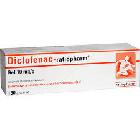Latest Blog Posts:
Get Updates & Coupons
Drug: Diclofenac Gel
What is Diclofenac Gel?
Diclofenac Gel is a topical drug used in reducing pain and inflammation. It’s usually recommended for osteoarthritis, muscle strains and other inflammatory disorders. The formulation of the gel allows direct application onto the site, thus resulting into localized effect with minimal systemic absorption.
Benefits of Diclofenac Gel
- Targeted Relief: Instantaneous pain reliever & anti-inflammatory; applied on affected area directly (directly at/in/on) so as patient feels immediate comfort from inflammation or/and soreness due to injury.
- Lower Risk of Side Effects: The chances of developing gastrointestinal problems are lower when compared to oral NSAIDs as they are less likely to cause them when topically used via gel form.
- Convenience: A simple way to apply it by yourself at home makes it convenient for everyone who has had experience with medications against discomfort or/and irritation before.
How to Use Diclofenac Gel
You should use diclofenac gel as your healthcare provider tells you. Often, a little amount of the gel is rubbed on the affected area three or four times daily. Be sure that your hands are clean prior applying the gel on your skin surface while also avoid contact with eyes and mucous membranes because these can be harmful. Also, avoid applying the gel on the open wounds or infections.
Potential Side Effects of Diclofenac Gel
Even though Diclofenac Gel is usually tolerated well by patients, some people can still experience any of these side effects:
- Local Skin Reactions: Some individuals may experience redness, itching and swelling at the site where it has been applied.
- Gastrointestinal Issues: Even with topical application being less common than in other situations, some may as well suffer from stomach pain or uneasiness.
- Allergic Reactions: It’s most unlikely that an individual will be allergic to diclofenac gel (anaphylaxis). This can result in a rash, itchiness or shortness of breath.
Conclusion
The alternative to direct application for proper pain management concerning many health conditions such as arthritis provides an opportunity for focused treatment and fewer side effects. However, it is important to use this medication with supervision from a medical professional so that it could be safe and efficient. You should call your doctor right away if you have any allergic reaction.
Diclofenac Gel can make a huge difference to anyone living with pain and inflammation. Learn about its benefits as well potential side effects which will enable patients’ decision making on including the product into their healthcare routine.




